Miss Grit: "I grew up being a little bit of an analogue purist, but that kind of thinking limited my creativity"
Miss Grit follows up previous EPs with the utterly captivating debut album, Follow The Cyborg on Mute. Hamish Mackintosh finds out more
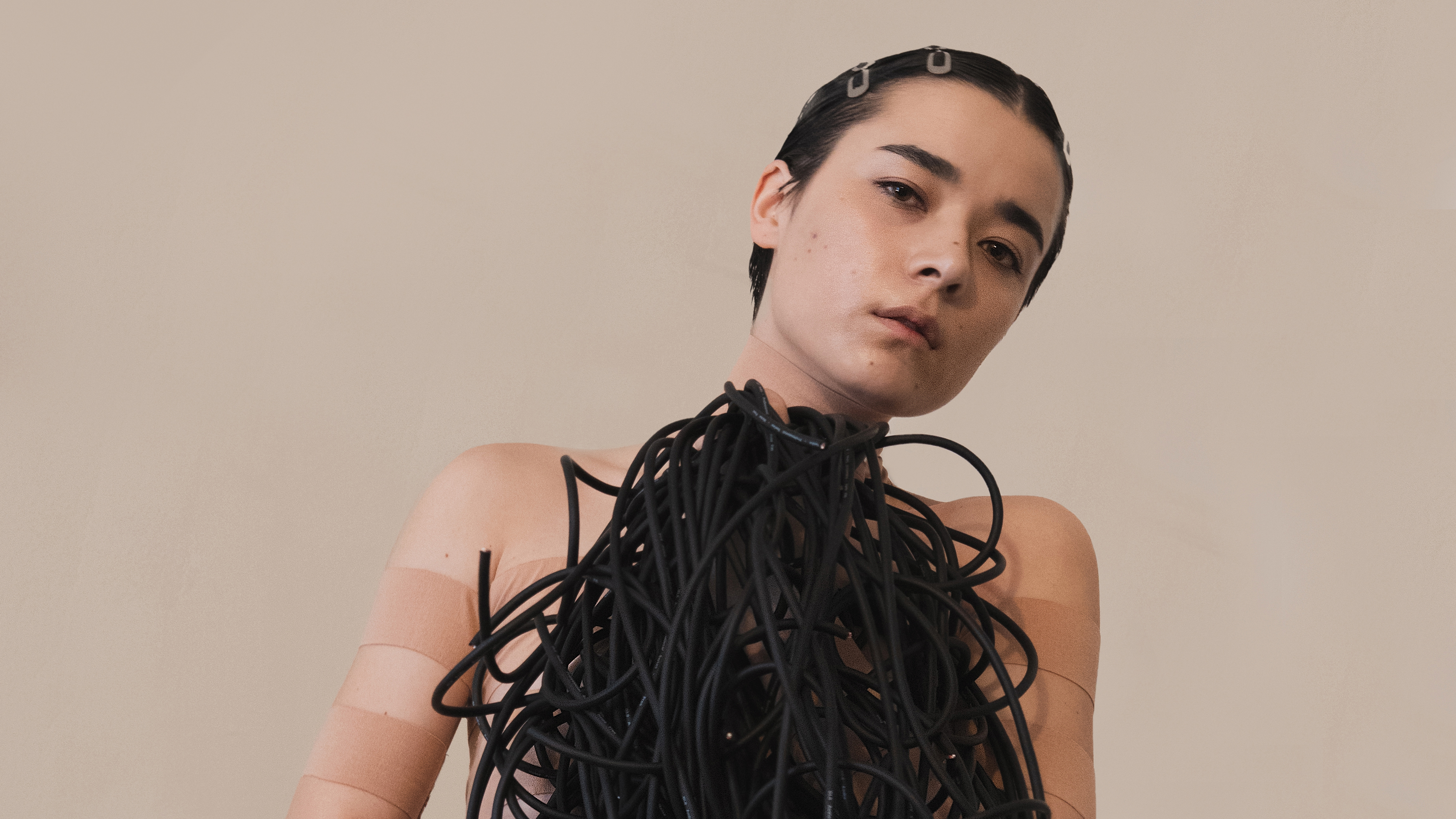
Miss Grit, otherwise known as New York musician and polymath Margaret Sohn (they/she) may already have been on many of our radars after their intriguing EPs Talk Talk (2019) and Impostor (2021) but their debut album, Follow The Cyborg just released on the ever wonderful Mute, presents a young artist completely finding their voice on a dazzling collection of self-produced electronic-infused songs.
Drawing inspiration from the worlds of cybernetics, anime and cinema, Follow The Cyborg is awash with sublime melodies, pulsing synths and thought-provoking lyrical concepts. Sohn’s plaintive vocals explore the relationship between a cyborg and its human whilst never straying far from an intoxicating melody.
Lovingly fashioned in their immaculately tidy home studio in Flushing, Queens, on the LP, Sohn ponders what it is to be human in a world awash with information technology. If you’re going to take on such lofty themes for a debut album then you best come up with the melodic goods and Sohn does so with rhythms to spare.
We caught up with Miss Grit in their aforementioned home nerve-centre to talk cyborgs, Ghost in the Shell and how analogue-modelled software might just be their newest obsession.
There’s a cyborg concept running through the album. Was that there from the inception of the album?
“Yeah, so the first song I wrote for the record was Like You and it started as an inspiration from the movie Ex Machina. I was reading an essay by Jia Tolentino at the time that referenced cyborg-theory and Donna Haraway’s essays and I just felt really drawn to that.
“I’ve grown up loving movies like Her, Ex Machina and Ghost in the Shell, so reading that essay helped pull everything together and made me understand what it was about these stories and protagonists that I relate so strongly to.”
Want all the hottest music and gear news, reviews, deals, features and more, direct to your inbox? Sign up here.
The album is an ongoing conversation between the cyborg and its human, isn’t it?
“Yeah the cyborg and the creator was kind of the story I wanted to tell throughout it. I’ve always been a really big fan of concept albums so it’s something I wanted to try out for myself. So, it’s about that cyborg/creator story arc but it’s also me communicating my own personal feelings and life experiences through that story too.”
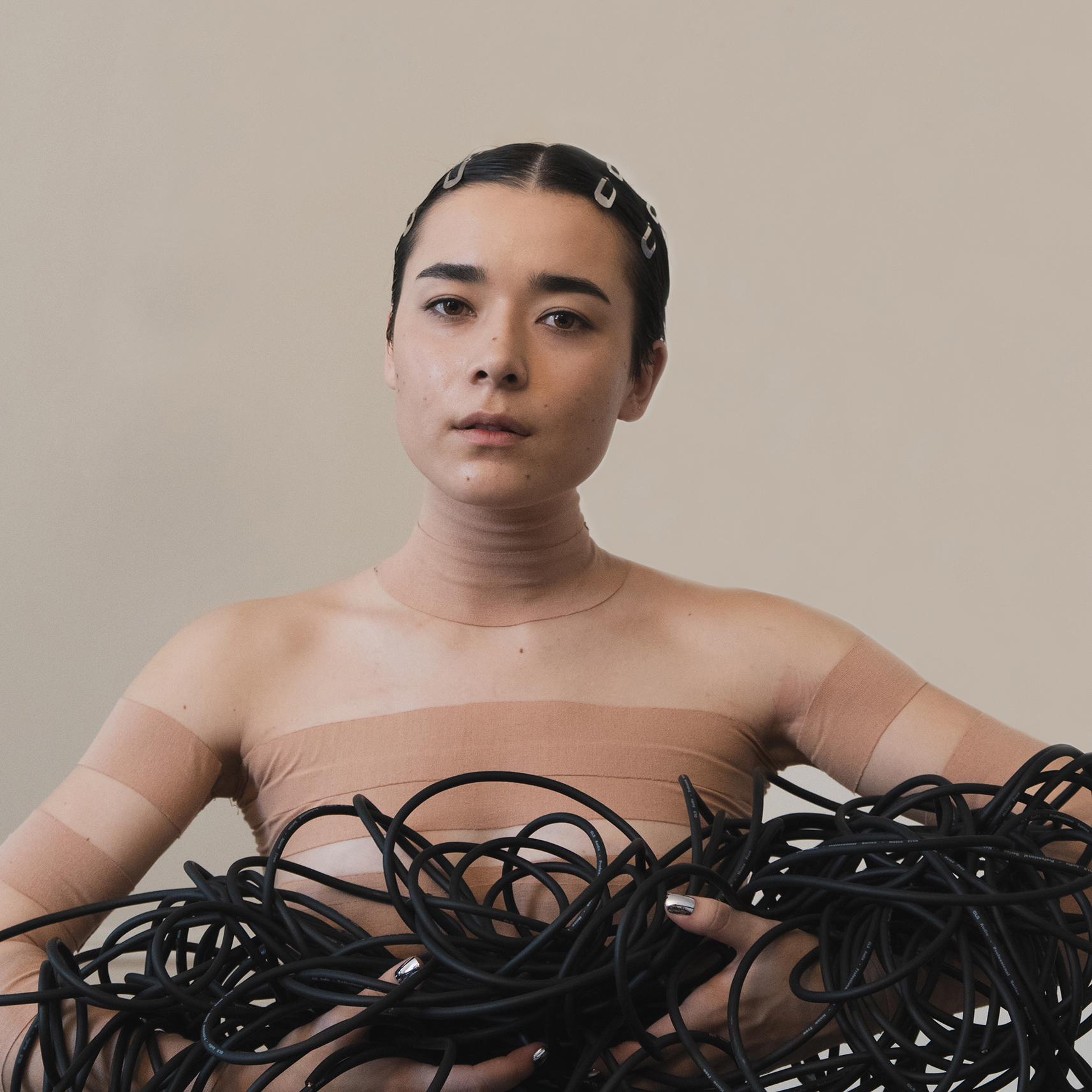
Even ten years ago this concept would’ve been still a fairly distant thing but advances in AI et al make it very prescient to the present day…
“Definitely. It’s crazy that a lot of the movies and anime that deal with this subject matter came out 20 years ago and are only now really becoming applicable with reality.”
How has your interaction with technology evolved between this album and your earlier EPs?
“I definitely approached things differently than with the previous EPs. I went to a school for music tech so I learned a lot about analogue gear and all my peers there were big gearheads so I grew up being a little bit of an analogue purist, I guess.
“I think that kind of thinking maybe limited my creativity so, for this record, I just really wanted to allow myself the opportunity to use more virtual instruments and plugins and not be too set on recording everything the most prestigious way possible.
“I allowed myself that little bit of freedom. Lots of voices in my head go off when I’m in the recording process but I have to just forget about them so I can proceed to create in a freer way.”
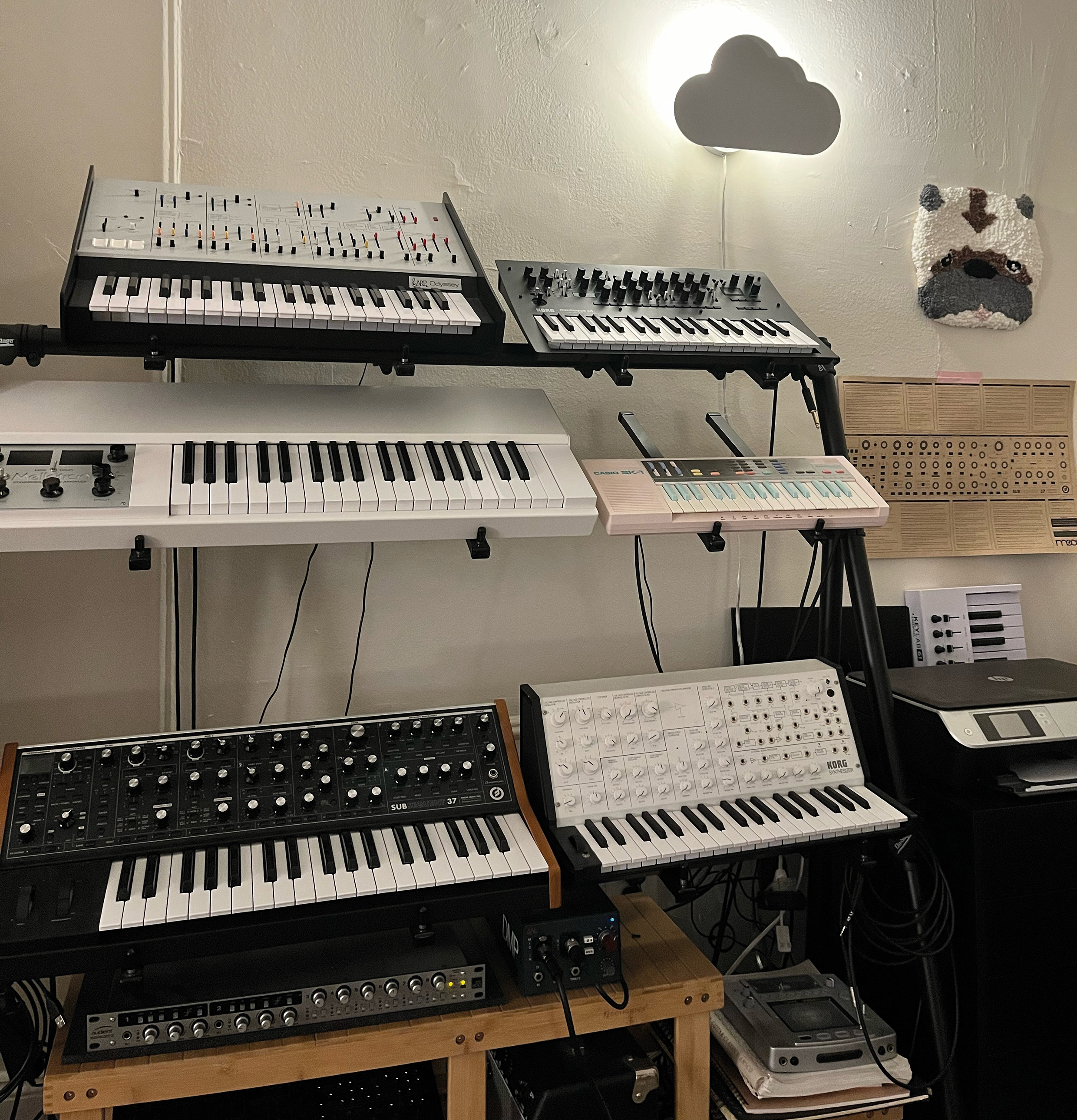
The album was all done in your home studio in New York, wasn’t it?
“Yeah. Most of it was, except for the live drums that are on a few songs and also bass recorded by a friend.”
What were your go-to soft synths?
“I had literally just bought the Arturia bundle of virtual instruments and that really just blew the door wide open! I started playing around with the Buchla Music Easel they have in it and the Farfisa, which I used a lot on the album. The Mellotron V is a really nice tool to work with too.”
Arturia have an excellent grasp of modelling lovely old hardware gear…
“Totally. I actually ended up buying a hardware Digital Mellotron but I’m honestly thinking of selling it as the plugin gives me way more options. You can play with the envelopes and use different tape saturations with the plugin version whereas the actual hardware version is kinda limited in that way.”
So, what else is at the core of your studio setup?
“I still have my first ever synth, which was a Korg MS-20 and that’s something that still comes up a lot in my music. I recently acquired a Moog Sub 37 but I still find myself going back to the MS-20 as the sound is very familiar to me and I just took to it in my formative years of learning the ins and outs of hardware synthesisers. So, the MS-20 is definitely at the core of my studio.”
How do you find your hardware MS-20 compares up against the software version?
“Honestly, I think most of the Arturia versions compare quite favourably to the original synths. I haven’t done an A/B test comparing them side by side but nothing from the Arturia bundle screams fake to me at all. They’re all really solid.”
Do you do everything in the box?
“It can be a mixture. I use a lot of my electronic drums… I have the whole Samples From Mars collection, which is super-useful and extremely affordable. I got their entire library of drum machines and synths for their $40 deal, which was crazy! They’re great samples so I find myself reaching for them a lot to start a song off.
“It usually starts with a drum pattern from that or a bassline from the MS-20 or something chordal that’s been attracting me at that moment. I also have a Casio SK-1 there that I really love to use. The flute mode on that is really beautiful and I find a lot of inspiration from the tones that come out of the Casio.”
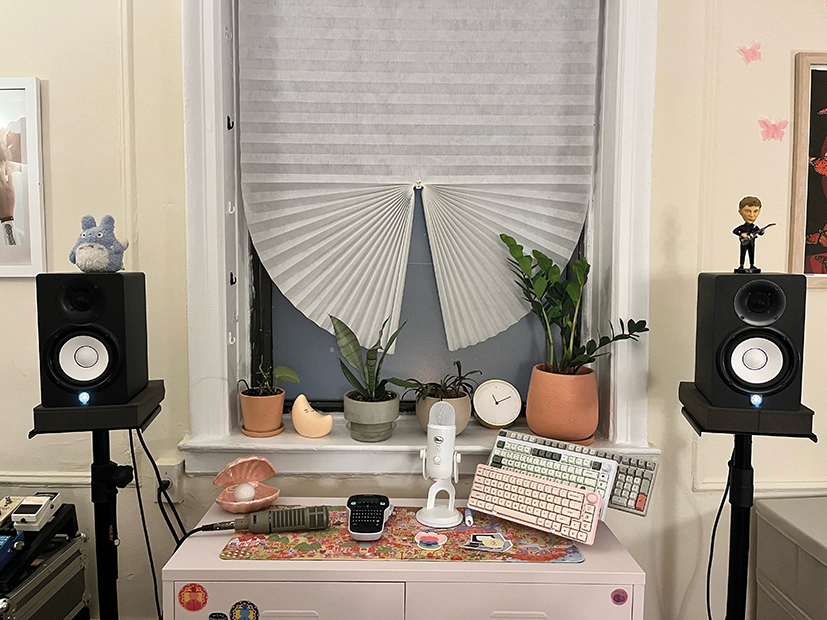
There’s definitely something about those retro Casio sounds…
“Absolutely. The SK-1 is my only Casio just now but I definitely want to start a little collection as I’ve got friends who have different ones and they’re all pretty unique
and special.”
Which DAW do you run everything into?
“I use Ableton. I actually started on Pro Tools and that’s what I was using for the last two EPs but I switched over to Ableton for the virtual instrument thing, really. I’m enjoying using it although I don’t use the Session View window where you can trigger the different sequences. I still use the timeline because it’s more like the Pro Tools way, I think. Ableton is just really nice with MIDI.”
Did taking your course in music tech help you navigate your way around all the different DAWs and software?
“Definitely and I really do appreciate having gone to school for music technology as a lot of those courses demanded that you have a sort of engineering way of approaching music… like getting into the nitty gritty of waveforms and using different software like Max/MSP and breaking down sound that way.
“I also took electronic courses so I learned about building circuits for guitar pedals. I just really enjoy hands-on activities like that so it was a cool experience and I still use a lot of the things I learned.”
One of the big talking points in music at the moment is the use of AI in music – where do you stand on that?
“I guess I haven’t done a whole lot of research into both sides of the argument. Each phase of making music is a creative process… mixing is a creative process, as is mastering. I think replacing human creativity with machine algorithms is going to produce a certain result but it’s not necessarily something that’s able to replace human creativity.”
You have a great line in the song Lain, where you sing “I don’t want to see everything anymore”. Is that a plea from someone drowning in technology and information?
“Yeah, I guess it’s my battle with social media or any kind of socialising with the outside world and being susceptible to influence by everything that’s attacking you at once like ads and commercials to friends or people you work with.”
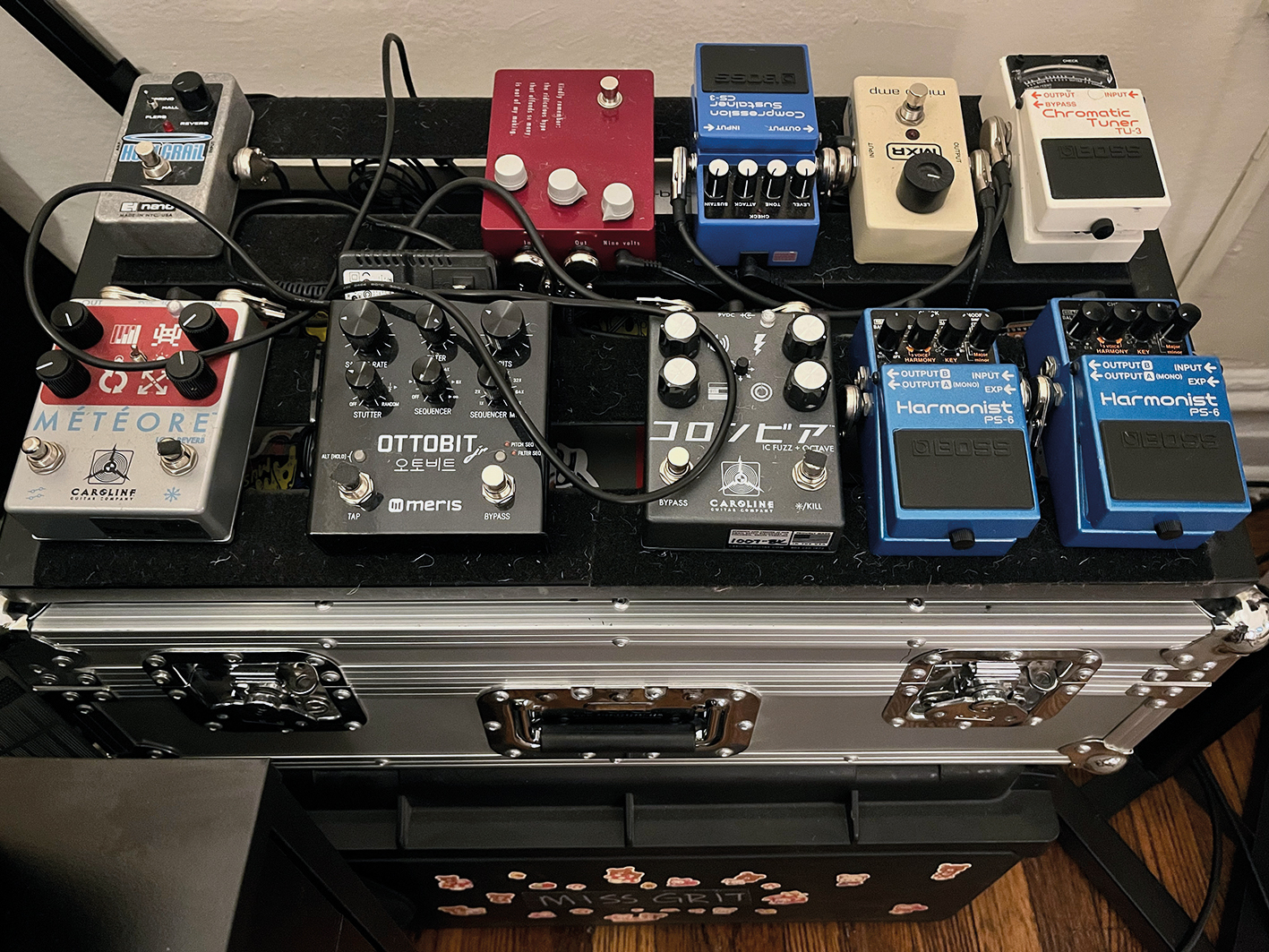
Do you envisage a future where the human element of electronic music making will be dispensable?
“I think technology will inevitably produce a different product in the end. Not that I like talking about music as a product. Human choices and creative decisions are always going to bring something different to the table so maybe there is room enough for both to co-exist although I’m not so sure that we’re responsible enough consumers to balance them.”
Was it important to you to still have guitars in amidst the synths and plugins?
“Yeah. Mainly because I think the guitar is like another ‘voice’ for me as it’s the instrument I’ve known the longest so it serves as a different way of expression for myself as opposed to just singing. It’s always important for me to interject with a guitar line in certain parts of songs.”
Is there a lot of processing to the guitar in the box?
“Yeah, but I have a lot of hardware pedals too. One pedal I used a lot on the album is the Ottobit Jr. by Meris, which has been the core of my guitar sound for a while.”
Do you think it’s harder to get emotion from a synth than from a guitar?
“I actually don’t think so. I’ll often times reach for a synth or a drum machine for the beginning of the process, just because I’ve been playing guitar so long that I have so many habits involved in it - reaching for a synth can allow me to express more freely. There are definitely limits but then everything is limited and you’re just working within the boundaries of each tool, I guess.”
Are there any bits of hardware or software that you’d like to add to your current setup?
“I’ve never been super into polysynths, I have a lot of monosynths, so I think the next thing I’m eyeing is definitely a Prophet. I was at my friend’s house and tried out her Rev 2 [laughs] and I was very jealous.”
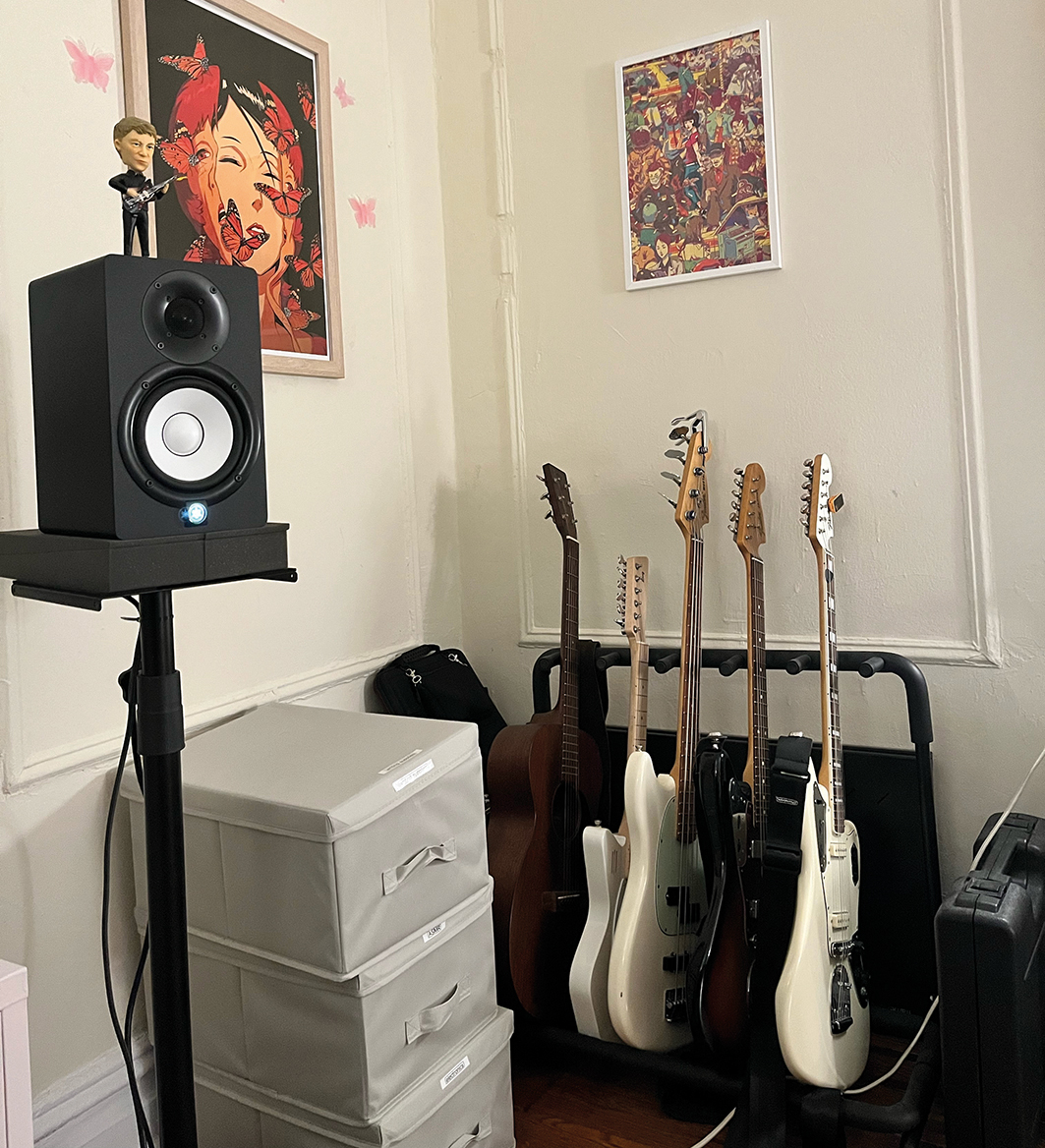
Where do you imagine music software evolving to next?
“I’ve really only effectively scraped the surface of my own exploration of plugins so I’m really interested in using more plugins for production as I currently don’t use a ton of plugins for that so that’s my own next adventure in software. Plugins are a lot more affordable too so they allow a lot more people access to the sounds.”
Given you have a few collaborations on your album, is that a good way to avoid the bubble of working on your own making electronic music?
“Definitely! A lot of the process is working alone so when I do bring people in it can be a really nice realisation or just a different perspective of listening to the music as you’re bringing in someone else’s ears and then you can experience your song from their perspective a bit. Like, working with Stella [Mozgawa of Warpaint] was amazing.
“She recorded drums for Perfect Blue and Follow The Cyborg and she brought out some great things in the song that I wouldn’t normally have done. Also, working on lyrics for the last song. Syncing, with my friend Nicole (aka Pearla) was a really special experience too. Just having someone to help you communicate your ideas, especially a close friend, was really nice.”
Are you taking the album out live?
“Yeah, I’ve started planning a lot of live shows and I haven’t really played live a whole lot, so I’m really excited about that.”
Miss Grit's debut album Follow The Cyborg is out now on Mute.

